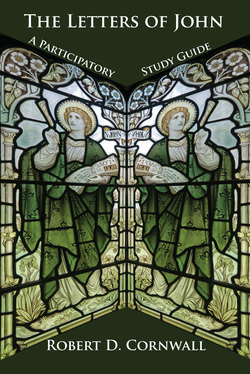Читать книгу The Letters of John - Robert D. Cornwall - Страница 2
На сайте Литреса книга снята с продажи.
ОглавлениеPraise for The Letters of John: A Participatory Study Guide
The Letters of John are essential reading for today’s Christian. They reveal a Christianity in the making, defining itself, charting its ethical course, and seeking to articulate a life-changing theological vision of Christ, embodied in the world and in our lives. In our pluralistic and polaristic time, in which many Christians fear cultural, religious, and political changes, we need to remember that faith flourishes when we choose love rather than fear. Bob Cornwall’s text on the Letters of John invites us to engage first century Christianity in ways that will help us understand more clearly our vocation as Christians in our own time. The text is clear, articulate, and academically sound, ideal for congregational study groups and personal reflection. Bob Cornwall’s interplay of theology, biblical studies, and spiritual practices will inspire and guide us in creative responses to our post-Christian, pluralistic and contentious time.
Bruce Epperly, PhD
Pastor and Author
Robert Cornwall has written a guide for a Bible study that is needed in churches today. There is solid background material for study that anyone, regardless of Bible study experience, can use well. The breakdown of material with reading scripture, a lesson, meditation and discussion questions, and a time for prayer is designed for wonderful deep conversations. This Bible study is needed today as it reminds us of who we are as the Body of Christ while inspiring us to love one another, live in truth, and work towards restoration.
Shauna Hyde, PhD
Pastor, Counselor, Author
Tucked away near the end of the 27 books that make up the Gospels and Letters, it is easy to forget the Letters of John or to think of them as sweet little notes on love. Through the eyes of theologian, minister, and biblical interpreter Robert Cornwall , we see these letters as muscular theological statements that John directed to electric theological controversies concerning the nature of Jesus and concerning the nature of relationships in the church and mission in community that are still taking place in congregations of all sizes and theological stripes today. Cornwall initially outlines the model of participatory Bible study that can structure each class session and that includes both placing the text in its historical context and meditating on the significance of text in disciplined ways while also identifying points of contact with church and world today. Along the way, he identifies—and respects—the different ways passages might be interpreted. Individual readers and study groups receive a double blessing: (1) a study focusing specifically on the Letters and (2) a model for studying other biblical texts. This book would be an ideal resource for studies and sermons—the congregation studies a passage during the week as background for the sermon on Sunday. The eleven chapters in the book would make an ideal structure for such an effort.
Ronald J. Allen, PhD
Professor of Preaching, and Gospels and Letters, Emeritus
Christian Theological Seminary
In this commentary, Bob Cornwall integrates well his scholarly abilities with pastoral concerns. In the letters of John we have a “theology on the ground,” and Cornwall navigates us through the writer’s theological concerns that relate to the ministry of John’s community. This book is rich in its depth and practical in its application. Bob brings the message of the letters “that which was from the beginning,” and speaks to the concerns of Christians in the twenty-first century.
Allan R. Bevere, PhD
Pastor, Ashland First United Methodist Church
and Professional Fellow in Theology,
Ashland Theological Seminary, Ashland, Ohio
